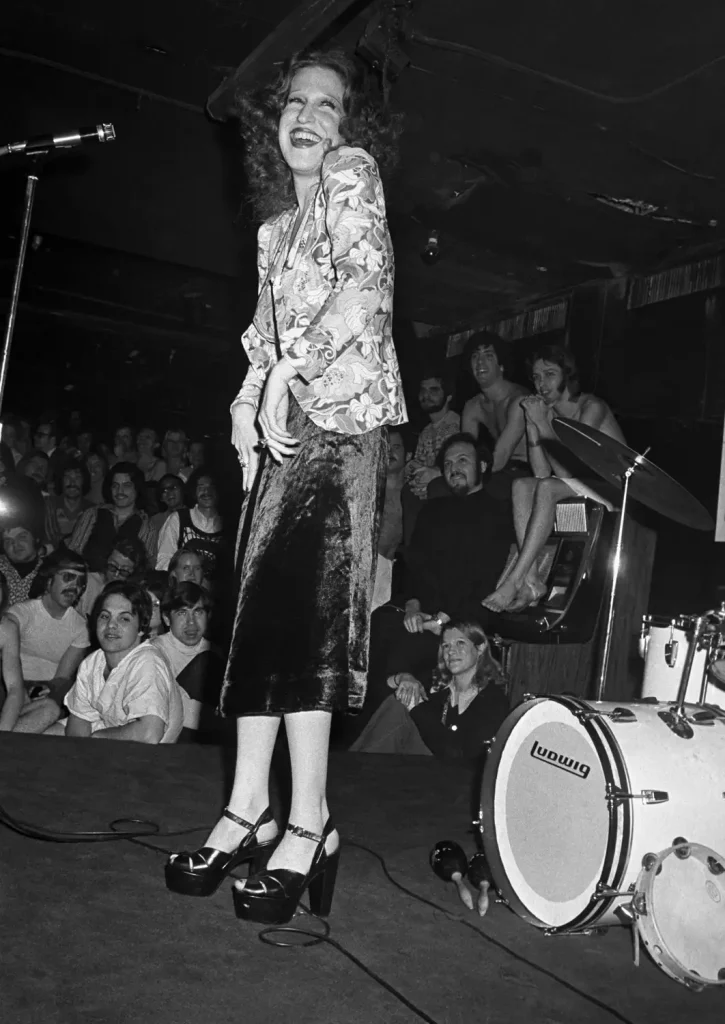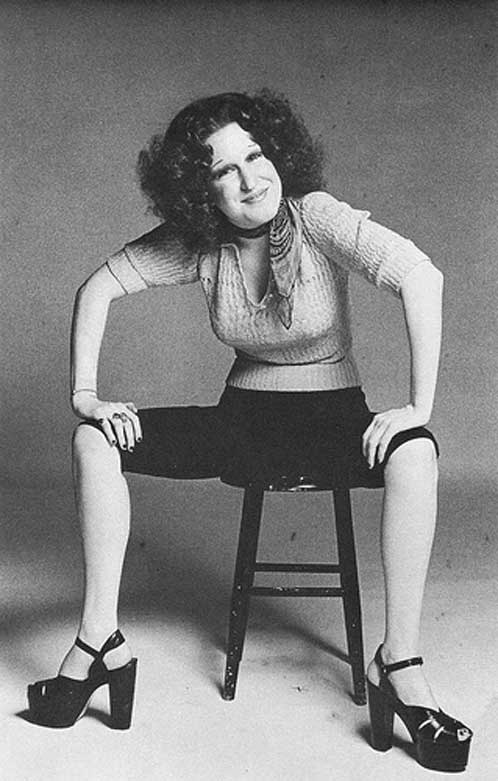People
Inside Bette Midler’s Steamy Rise to Fame
By Gillian Telling
April 14, 2024

In 1970, an openly gay man named David Vass was launching his career as a lighting and tech director when he was hired to oversee the sound and lighting at the Continental Baths, which were housed around the giant swimming pool under the Ansonia Hotel on New York City’s Upper West Side.
The ‘Baths,’ as it was called, was a popular gay men’s sex club and cruising space, and at 48,000 square feet, it was massive.
While it was successful as a (not so) secret sex club, the Baths’ owner, Steve Ostrow, decided to add live entertainment on Saturday nights. He hired the then relatively unknown singer Bette Midler, a cast member in the original 1967 Broadway run of Fiddler on the Roof, to perform once a week under a three-month contract at $50 a gig. (She later renegotiated him up to $100 a pop.)
“It was the most primitive sound and lighting cabaret system in all of N.Y.C., I think,” Vass tells PEOPLE exclusively, of having to figure out how to make the sound work for both Midler and the Baths’ in-house pianist, a then unknown Barry Manilow.
“I made lighting out of tin cans and used my friends who were backup singers to borrow good microphones from their studio sessions. I couldn’t use a spotlight because it was a basement, and the ceiling was very low. It was a mess,” Vass says. Barry Manilow could never keep the piano tuned because of all the humidity.”
Still, he’ll never forget watching Bette Midler become a superstar after those bathhouse gigs. it was an instant success, but he says some of the patrons, who were there to meet other men, were initially confused.
“Some of the regular guys who frequented the Baths scratched their heads, wondering, ‘What was this woman with wild red hair, in thrift shop clothes and outrageous makeup doing here, standing by the piano and singing tunes from the ’40s and cracking bawdy jokes?” he says with a laugh.
However, it wasn’t long before the regulars and a host of celebrities became fans of her show.
“Suddenly, A-listers and socialites were lining up to get in on Saturday nights,” Vass recalls.
“Alfred Hitchcock, Andy Warhol, Mick Jagger, Truman Capote, Liza Minelli, Rita Moreno, Princess Margaret, Valentino, Carol Channing, David Bowie, Lee Radziwill, Bob Fosse and Gwen Vernon, you name it. They loved ‘Bathhouse Betty,’ and it was the place to be seen on Saturday nights from 10 p.m. to midnight. Paparazzi were lined up outside to get shots of all the famous people who came.”

Vass says that before each show, Midler would sing “The Star-Spangled Banner” a cappella before launching into her act. “She knew the audience would stand up for it, along with the gay bathhouse patrons, many of whom dropped their towels and mooned the celebrity audiences,” he says with a laugh. “Bette had an outrageous sense of humor and always got off on that moment. She knew how to handle her audiences, always with humor and a wink.”
He says Midler would launch into her set, most of which were retro tunes from ‘30s female singing groups like The Andrews Sisters. In between songs, she’d let out a stream of salty jokes. She had two backup singers named The Harlettes—the original ones were Melissa Manchester and Cissy Houston, Whitney’s mom.
“Originally there were velvet ropes to envelope the folding chairs for the mostly straight, very trendy, patrons to watch the show from… to keep then ‘contained’ from what was happening in the back rooms,” Vass says.
“But it only took a few weeks and the Saturday night glitterati would sneak off and ‘explore,’ and let me tell you, did they get an eyeful. There were candy dispensers filled with small packets of KY, the dispensers at the entrance to the two showers filled with a medication to use to kill lice. The water fountain was filled with mouthwash.”
Vass says by the time Midler’s three-month contract was up, she had signed a record deal with Atlantic Records. Her first album, the Divine Miss M, would be released in 1972, and she skyrocketed to stardom from there, winning a Grammy for best new artist in 1974.
When Midler played her final show at the Baths, Vass says at least 500 people showed up.
“You have to remember, this was in the basement of the Ansonia Hotel, with leaking water pipes, cockroaches, a steamy pool and no air-conditioning. That night was so hot, makeup was melting down everyone’s faces,” says Vass of that final, very hot show. “But it was a night to remember.”
Soon after Midler left, Vass, who recently published the memoir Liar, Alleged: A Tell-All of Sex, Celebrities, and All the Rest, about working with the biggest names in the cabaret biz at the time, says the Baths started to decline in popularity.
“Drug dealers started showing up to push angel dust and Quaaludes, and the gay patrons started to feel used during the Saturday night shows,” Vass says. “They felt like monkeys in the zoo, to be gawked at by straight socialites.” He adds, “You must remember, it was illegal to be gay until 1980. In those days, the FBI, the military police — they sent undercover men into the baths, and if you were recognized, you lost your job, your family, or worse.”
A year after landing the job, Vass got a better gig at a famous cabaret in the Village. “I landed the tech director position at the trendiest, real cabaret in NYC, Reno Sweeney,” he says. There, he worked with acts like Peggy Lee and Little Edie Beale.
By 1976, he says the Continental Baths had closed. “They tried to put in a disco floor and DJ and lure gays back in, but it was too late,” he says. “Then they tried to turn it into a straight bathhouse, but that didn’t work,” he says, of the baths rebranding into a sex club for straight people called Plato’s Revenge.
Though his gig at the Continental Baths lasted only a year, Vass says he’ll never forget that time or having witnessed Midler becoming a star.
“I still think back on those days and laugh,” he says. “Her jokes, her ability to charm all those A-listers. I later worked with Grammy and Tony winners, but the best part of my job was the excitement of new talent like her finding themselves.”
He adds, “Those ‘Bathhouse Betty’ gigs could never happen now. It was a place and time when New Yorkers were looser, more experimental, and had a sense of humor,” adding, “I miss those days.”






